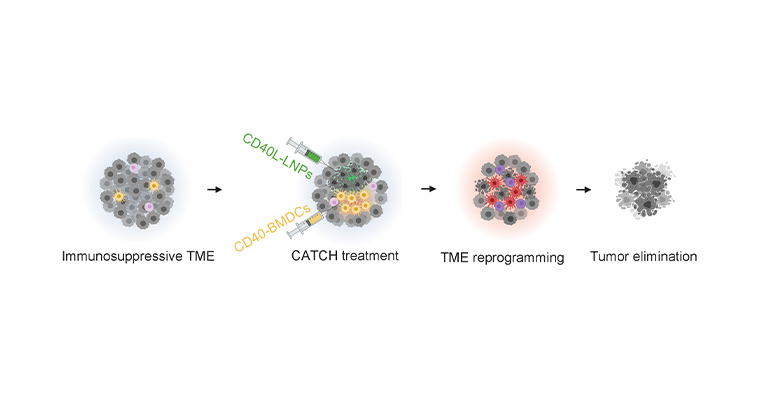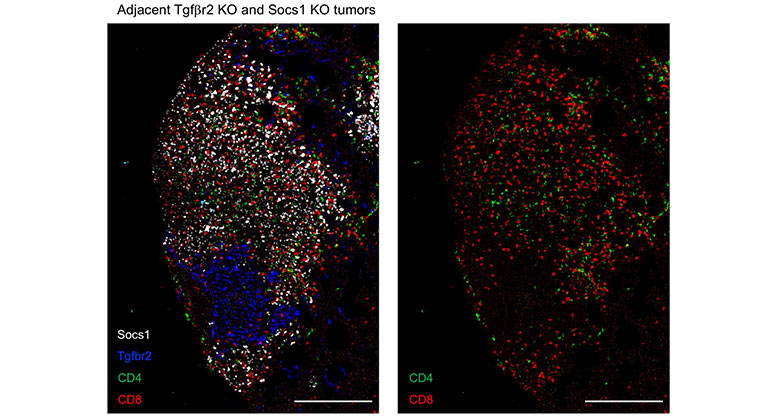Mount Sinai Scientists Establish Link Between Neurodegenerative Disease and the Body’s Response to Viral Infection
A key protein previously implicated in Lou Gehrig’s disease and other neurological diseases plays an important role in the response to viral infection.
A key protein previously implicated in Lou Gehrig’s disease and other neurological diseases plays an important role in the response to viral infection, according to a study led by scientists from the Icahn School of Medicine at Mount Sinai published today in Nature Immunology.
Neurological diseases have long been associated with inflammation, part of the body’s response to injury or infection that occurs when immune cells home in to attack invaders like bacteria and viruses, and to drive healing, but the link between them has not been understood.
This new study result suggests that genetic changes take away the ability of a protein called senataxin to moderate the inflammatory response to certain viral infections, possibly leading to persistent inflammation that could aggravate disease progression.
Using cutting-edge genomic tools, the scientists found that senataxin is deployed to quench the body’s natural antiviral response at a specific point; without such control, prolonged exposure to the antiviral response can lead to inflammation. People with senataxin-related forms of ALS and ataxia have a defective SETX gene that leads to a dysfunctional form of the protein.
“We knew this protein was important, but its precise activity and role in the antiviral response had never been demonstrated before,” said Harm van Bakel, co-author of the paper and Assistant Professor in the Department of Genetics and Genomic Sciences and in the Icahn Institute of Genomics and Multiscale Biology at Mount Sinai. “Teasing out the function of senataxin required an interdisciplinary approach that would not have been possible without international and cross-department collaboration and the advanced technology resources available at Mount Sinai.”
Scientists used gene expression studies as well as in-depth chromatin analysis to uncover the regulatory role of the protein. While most work to characterize the protein has been conducted in yeast cells, this project gained new information by analyzing human cells and animal models. The team found that senataxin has far more power to regulate gene activity than was previously known.
“This is a protein implicated in neurodegenerative disease that has now been linked to our innate antiviral mechanism, and it offers an intriguing clue to a relation between the inflammatory response and these diseases,” said Ivan Marazzi, co-author of the paper and Assistant Professor in Microbiology at Mount Sinai. “Whether viral infection plays a role in disease progression remains to be seen, but this discovery has broad implications for biomedical research and opens up new avenues that we look forward to pursuing.”
Paper cited:
Matthew S. Miller, Alexander Rialdi, Jessica Sook Yuin Ho, Micah Tilove, Luis Martinez-Gil, Natasha P. Moshkina, Zuleyma Peralta, Justine Noel, Camilla Melegari, Ana Maestre, Panagiotis Mitsopoulos, Joaquín Madrenas, Sven Heinz, Chris Benner, John A. T. Young, Alicia R. Feagins, Christopher Basler, Ana Fernandez-Sesma, Olivier J. Becherel, Martin F. Lavin, Harm van Bakel, and Ivan Marazzi. “The helicase senataxin suppresses the antiviral transcriptional response and controls viral biogenesis.” Nature Immunology. DOI: 10.1038/ni.3132
About the Mount Sinai Health System
Mount Sinai Health System is one of the largest academic medical systems in the New York metro area, with more than 43,000 employees working across eight hospitals, over 400 outpatient practices, nearly 300 labs, a school of nursing, and a leading school of medicine and graduate education. Mount Sinai advances health for all people, everywhere, by taking on the most complex health care challenges of our time — discovering and applying new scientific learning and knowledge; developing safer, more effective treatments; educating the next generation of medical leaders and innovators; and supporting local communities by delivering high-quality care to all who need it.
Through the integration of its hospitals, labs, and schools, Mount Sinai offers comprehensive health care solutions from birth through geriatrics, leveraging innovative approaches such as artificial intelligence and informatics while keeping patients’ medical and emotional needs at the center of all treatment. The Health System includes approximately 7,300 primary and specialty care physicians; 13 joint-venture outpatient surgery centers throughout the five boroughs of New York City, Westchester, Long Island, and Florida; and more than 30 affiliated community health centers. We are consistently ranked by U.S. News & World Report's Best Hospitals, receiving high "Honor Roll" status, and are highly ranked: No. 1 in Geriatrics and top 20 in Cardiology/Heart Surgery, Diabetes/Endocrinology, Gastroenterology/GI Surgery, Neurology/Neurosurgery, Orthopedics, Pulmonology/Lung Surgery, Rehabilitation, and Urology. New York Eye and Ear Infirmary of Mount Sinai is ranked No. 12 in Ophthalmology. U.S. News & World Report’s “Best Children’s Hospitals” ranks Mount Sinai Kravis Children's Hospital among the country’s best in several pediatric specialties.
For more information, visit https://www.mountsinai.org or find Mount Sinai on Facebook, Twitter and YouTube.

New RNA-based Therapy Combats Melanoma in Mouse Models
Jul 27, 2023 View All Press Releases
Targeting One Type of Immune Cell With Another Slows Cancer Growth in Preclinical Studies
Oct 25, 2022 View All Press Releases
Novel CRISPR Imaging Technology Reveals Genes Controlling Tumor Immunity
Mar 15, 2022 View All Press ReleasesMount Sinai Researchers: Why COVID-19 May Be Less Common in Children Than Adults
May 22, 2020 View All Press ReleasesAirway Microbiome and Host Interact Differently in Children with Severe Asthma
Mar 12, 2020 View All Press Releases

